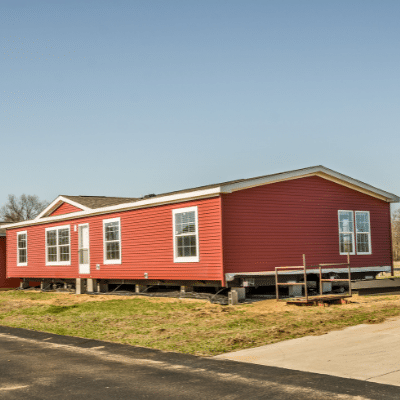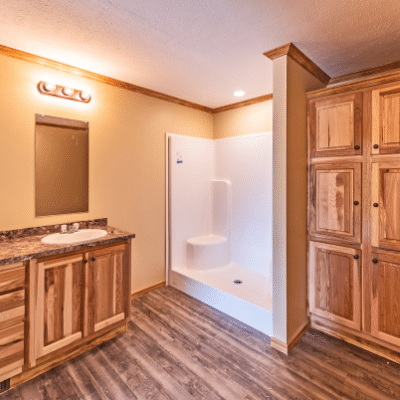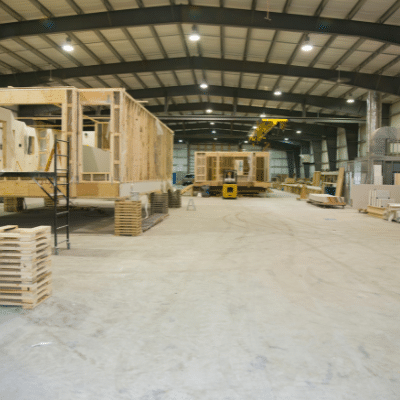How to buy a manufactured home
Thinking of buying a manufactured home? Whether it’s a brand new one or a used one, there are some things you need to know before making a decision. In this blog post, we’ll give you tips and helpful information on how to buy a manufactured home. So, read on for all you need to know about manufactured homes!
In general, there are two types of manufactured homes: single-wides and double-wides. They can be an excellent option for those who want a low mortgage payment or a smaller house that’s still affordable.

Stick-built vs Manufactured Home: What's the difference?
A manufactured home is classed as a building unit or section, transportable in one or more sections. When you buy a manufactured home, you buy one or more sections.
Typically, stick-built homes are built on-site, while manufactured homes come in pre-built sections, which are set up at the buyer’s destination on a prepared foundation, usually made of concrete blocks. Manufactured homes are also known as mobile homes.
It’s a common assumption that manufactured homes are cheap and easy to purchase, but there are nuances in this process that can turn it into a costly headache. To empower buyers, here is everything you need to know about buying a manufactured home!
- The first rule of buying a manufactured home is to educate yourself on the process.
- Manufactured homes are not designed to withstand hurricane winds above 90 MPH, but some communities do require them to comply with building codes for ground-mounted units.
- Fireplaces in manufactured homes are typically gas or electric inserts that cost more than standard furnaces. In addition, the ventilation system must have a chimney hookup at least 12 inches from any combustible materials. This isn’t always possible when you’re dealing with an exterior wall, so keep it in mind when sizing out a space for your dream manufactured home.
- Before viewing homes, investigate the development’s payment schedule, its rules and regulations (i.e. pets allowed or not), what amenities are available (pools, gyms, etc.), how much it costs to live in the community versus outside of it, what kinds of spaces are available for parking your manufactured home, and the distance from your home to the nearest landfill.
- Please do not assume you will be able to view the inside of a unit before buying it. When selecting one, find out how much viewing time you have before signing a purchase agreement, and check if there are any penalties for cancelling an order with a particular dealer or buyer’s agent.
- Research the average cost of moving a manufactured home in your area and factor it into your budget before purchasing your new community
- In some states buying a manufactured home may be as simple as paying for it. However, in others, you need to apply for a building permit in addition to paying for the manufactured home itself.
- When you purchase a new manufactured home, it will come with the latest upgrades and appliances. They will also have warranties for appliances and HVAC systems. However, keep in mind that manufactured homes are smaller than traditional houses, so you may need to upgrade certain things like the fridge or washer/dryer for your new home.
- Scrutinize the home closely for any signs of water damage, mold growth or insect damage. Check that everything works properly and inspect the entire house for any problems.
- To buy a new manufactured home, you will need to work with an agent or dealer to walk you through the process. They will go over important information with you and help you find a local community that is a good fit for your new manufactured home. We recommend finding someone from our vetted preferred partner’s list.
- To buy a used manufactured home, try asking friends or family who live in the area if they know of any homes for sale. You can also look on home sales websites or sign up to receive email alerts from manufactured home dealers to help you find a good deal.
- When you inspect the house, be sure to walk around the outside of the property and look for any signs of mold or water damage. Also, check that all appliances are working correctly and make sure there aren’t any electrical wiring problems like frayed or exposed power cables.

Benefits of Buying a Manufactured Home
- Aside from their affordability, another benefit to buying a manufactured home is that they’re delivered right to your lot.
- While you can also buy a new home and move it yourself, this can be an expensive undertaking. The lot will often already be prepared for you by buying a manufactured home.
- Also, because your neighbors are in similar homes, residents often have a sense of community.
- Manufactured homes can be built quickly and are often as customizable as a regular stick-build home.
Limitations of Buying a Manufactured Home
Despite being cheaper, manufactured homes do come with a few drawbacks.
- Manufactured homes cost less, mainly because they’re not as sturdy
- Insurance premiums will most likely be higher than what would be required for a full-sized home. This is because manufactured homes are seen as being more prone to damage due to their movable parts
- You can’t just “trade up” if you want to upgrade to a larger one. If you plan to move, your home can’t go with you. You’ll have to leave it behind
- You’re not allowed in some manufactured home parks unless you’re living there or visiting somebody who is. You will need to check local laws to find out about the residence requirements in your area

Inspecting a Manufactured Home
Here are the things you should inspect before buying any manufactured or manufactured home
- It’s important to know what you’re buying! Find an inspector that knows about manufactured homes if possible. They’ll be able to tell you if there are signs of water or structural damage. The more thorough they are, the better off you’ll be when it comes time to make an offer. Keep in mind that it’s not uncommon for these homes to last for at least 30 years.
- You’ll want to look at the roof (it should be relatively new if there are any repairs), walls, kitchen, and bathroom. Make sure everything is clean because it will give you an idea of how well-maintained. While you’re in the home, make sure sunlight comes in from windows and doors. While some light may come through cracks or even holes, overall, there shouldn’t be too much darkness indoors.
- Doing all of this research will help put you better positioned to choose the best manufactured / manufactured home for you.



